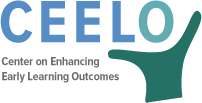The Center on Enhancing Early Learning Outcomes (CEELO) is proud to partner with New America on this blog series highlighting early learning opportunities and challenges under the Every Student Succeeds Act (ESSA).
The federal Every Student Succeeds Act (ESSA) strives to reduce academic achievement gaps for children. Research shows family engagement is essential to meeting this education goal. Families guide children on their learning adventures both in and out of classrooms, beginning at birth. Initial interactions with the formal learning system set the tone for subsequent years. ESSA recognizes this important role and provides opportunities to foster effective family engagement; however, it will be up to states and localities to adopt policies that enable educators to make the connections needed with families.
Research demonstrates that engaging families in the learning process nurtures positive outcomes for both young children and their families. Benefits for the child appear across multiple domains in early childhood development, including literacy and language, social and emotional development, and cognition. Families also benefit from increased knowledge about evidence-based parenting skills and gaining access to activities and supports that build family resiliency and well-being, such as health and mental health care, social services, and educational and workforce opportunities.
ESSA invites a more comprehensive approach to family engagement, with an emphasis on the ways families contribute to their child’s education. For instance, Title I requires district plans to be informed by families and to address how to “involve parents in the activities of Title I schools” (e.g., parent advisory boards). The law also specifies several ways Title I funding can be used to support stronger family engagement activities, such as providing professional development, supporting programs that reach families, disseminating information, and collaborating with community-based organizations. Title II funding supports training for educators on strong family engagement practices with ripe opportunities around joint training of parents, teachers, and other staff on effective transitions. The new Student Support and Academic Enhancement Grants (SSAEC) (Title IV Part A) can finance family engagement strategies under the supporting safe and healthy students area. Family engagement is included in other areas of ESSA as well– the migrant education program (Title I Part C), English learners (Title III), and children with disabilities.
Family engagement is key to both effective transitions from pre-K to elementary school and successfully addressing chronic absence, a goal many states propose as part of an accountability indicator.
Most states that have submitted their ESSA plans have included strategies to engage families in Titles I and IV, although discussion of family engagement was noticeable throughout many plans. Emerging from CEELO’s review are three actions that states who intend to submit in September may find useful.
States can lift family engagement up from a checklist item to an essential approach by explicitly speaking to its importance throughout the plan and including it in the overarching education vision for the state. In their ESSA plans, Delaware, Illinois, New Mexico, New Jersey, Massachusetts, and Tennessee devote considerable attention to defining family engagement, highlighting families as partners, and/or discussing its influence on child outcomes. For example, Delaware states in its Title IV A section that it “intends to use funds from a variety of federal and state sources to promote high-impact parent, family, and community engagement that is collaborative, culturally competent, trauma-informed, and focused on supporting the whole child academically, socially, and emotionally.”
Additionally, SEAs can promote alignment between early learning and K-12, as well as between different programs such as Head Start, state pre-K, and child-care. New Jersey’s ESSA plan describes how the Division of Early Childhood Education and Family Engagement is part of an interdepartmental team working to align strategies and resources across the department to support family and community engagement.
SEAs can also encourage LEAs to use professional development dollars for family engagement training. Massachusetts’ ESSA Plan, in its Title II section, points to family engagement training opportunities to support its pre-K and K Standards and, under Title IV, the state identifies opportunities for “joint professional networking opportunities on topics such as transitions between pre-K and kindergarten, family engagement and gender identity in the early years.“
States also can provide guidance and supports to help LEAs address the challenging how of implementation. Tennessee’s ESSA plan, for example, includes several detailed tables that outline strategies LEAs can use (along with funding sources). In describing supports for early learning to early elementary transitions, Delaware identifies a technical assistance need for “strategies for engaging families and providing access to supports—social, health, nutrition, and mental health services.”
Fortunately, a number of useful resources, activities, toolkits, self-assessments, policy briefs, and expert reviews of parenting interventions can provide SEAs and LEAs with a trusted repository of information. CEELO’s State Approaches to Family Engagement in Pre-K Programs offers guidance on what family engagement “looks like” in early learning settings. Additionally, SEAs can leverage successful practices underway in districts and programs by promoting them as exemplars, which both recognizes success and provides real-life examples that encourage buy-in from other educators – see Maryland’s Early Childhood Family Engagement Toolkit and Arkansas’ Guide for Promoting Family Engagement.
ESSA provides the opportunity for family engagement, but states will need to create the conditions for successfully building relationships with families focused on their children’s learning. While it takes more work, embarking on a systemic and research-informed family engagement approach can be a key driver for reaching the child outcomes that families desire, SEAs hope to achieve, and that the federal law envisions.
Melissa Dahlin synthesizes and analyzes research to inform technical assistance responses, writes for CEELO publications, advises and participates in evaluation of the project, and oversees the CEELO Information Line and website. Her experiences include technical training and assistance to support early childhood policy and practice, monitoring and evaluation, and classroom instruction. She holds an MA in International Educational Development from Teachers College, Columbia University.

